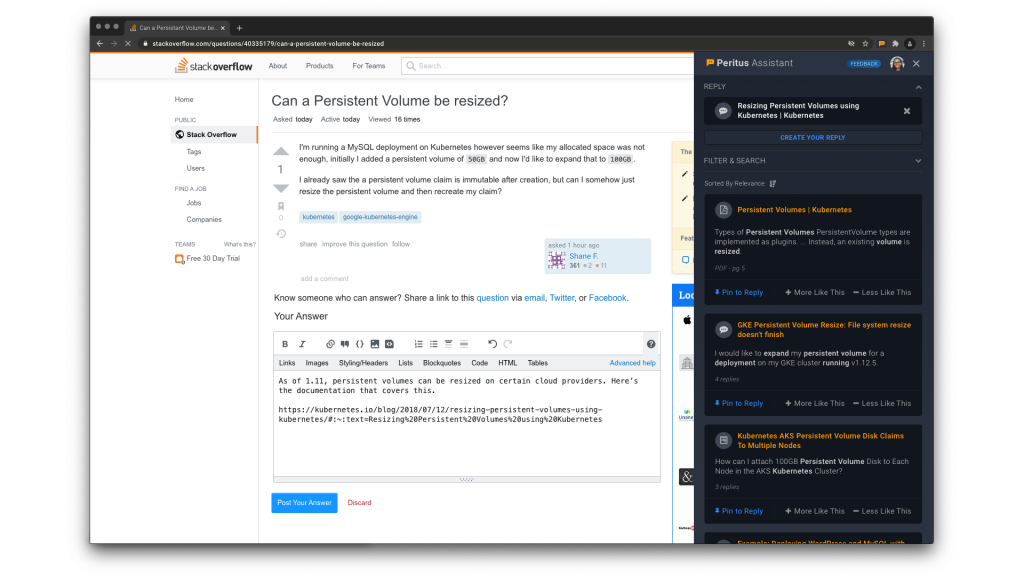Peritus AI Assistant Highlights Chronic Cloud-Native Skills Shortage
Peritus.ai announced today it has extended a recommendation engine that identifies online support resources for technology to include support for cloud-native platforms such as Kubernetes.
Robin Purohit, Peritus.ai CEO, says Peritus Assistant enables the company to employ machine learning algorithms to analyze support forums for 21 of the most widely used cloud-native computing platforms over the past 18 months, include Kubernetes, Docker, MongoDB, Elastic, PostgreSQL and NGINX open source software.
Less than a quarter (24%) of the questions submitted to these communities were answered in the first 24 hours. Nearly three quarters (70%) were never resolved, for a total of 163,000 unanswered questions.
In fact, the Peritus.ai analysis noted that only 2,675 community experts generated accepted answers, with the top 43% generating 80% of all resolutions.
Available as a free Chrome extension on the Google Chrome Store, Peritus Assistant employs machine learning algorithms to source and rank over 25 million questions, answers, tips from published content, conversations on the Stack Overflow site, related community product forums and GitHub.
That capability is now being extended to cloud-native technologies that are in the early stages of adoption among enterprise IT organizations. Support for Kubernetes is currently available, with support for Amazon Elastic Container Registry (ECR), Azure Registry, Docker, Elastic, MongoDB, OpenShift, Rancher and VMware Tanzu all forthcoming. In addition, the Peritus Assistant will also work with product vendor forums, including Kubernetes.io, Cisco and Palo Alto Networks.
While a tool for individual developers is available for free, there also is a paid subscription option available for product teams, which includes a SaaS application for case deflection and accelerating product adoption.
The Peritus Assistant analysis surfaces an issue that has long plagued many cloud-native computing platforms. In the absence of expertise required to run these platforms, many IT organizations have been hesitant to deploy platforms such as Kubernetes in a production environment. The online expertise that would normally be relied on to educate IT professionals, unfortunately, is just not readily available.
It’s not clear how the IT professionals that do have this expertise might feel about an AI tool that could potentially drive more queries their way. Some of those individuals may be getting incentives to respond to those queries, notes Purohit.
Regardless of motivation, however, it’s clear that roughly 2,000 cloud-native technology experts is not a large enough knowledge base to sustain multiple ecosystems. Of course, that lack of expertise is why so many organizations often rely on managed services provided by vendors. Many open source vendors may also be conflicted when it comes to what many of them view as free support, especially if they are hoping enterprise IT organizations will pay a subscription fee to access.
Nevertheless, many individual developers and IT operations professionals typically need a little extra help to get started. That’s been especially difficult to achieve at a time when many of those professionals cannot travel to a conference or training where they might pick up some of these skills. Even then, of course, many of those individuals may not get the travel funding approved so it’s likely, for the foreseeable future, the online world will remain the dominant cloud-native training resource.





